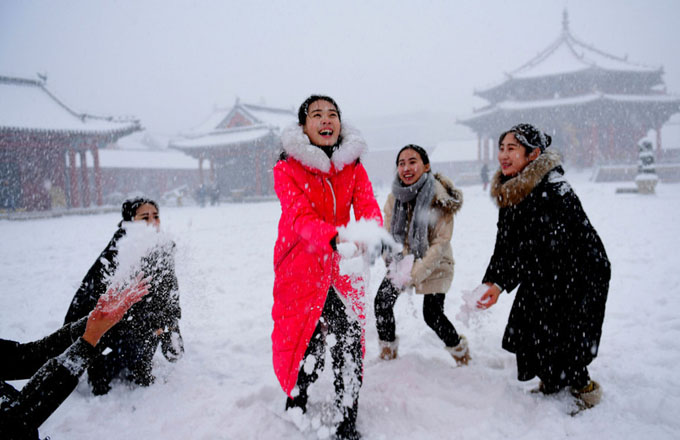Tourists besiege Palace moat with trash
![Litter dropped by tourists, mostly plastic packaging, dots the surface of the moat surrounding the Forbidden City in Beijing. It is diffi cult to clear the trash as the moat is half-frozen. [HOU SHAOQING / FOR CHINA DAILY] Tourists besiege Palace moat with trash](../../images/attachement/jpg/site1/20130227/00221917dead1297814703.jpg) |
|
Litter dropped by tourists, mostly plastic packaging, dots the surface of the moat surrounding the Forbidden City in Beijing. It is diffi cult to clear the trash as the moat is half-frozen. [HOU SHAOQING / FOR CHINA DAILY] |
The moat that served as the last defense of Chinese emperors since the Ming Dynasty (1368-1644) is now under attack — by trash.
The moat that surrounds the Forbidden City in Beijing is turning into a river of rubbish because of rampant littering by tourists.
Rubbish, mostly plastic packaging, flows on the surface of the half-frozen river.
"We can only send workers to clear the rubbish when the sun thaws the ice on the river because the trash is now frozen into the ice," said Ji Tianbin, deputy head of the Palace Museum, or the Forbidden City. "Nothing can be done before then."
Tongzi River, the Forbidden City's moat, was designed and built along with the imperial palace during the Ming Dynasty and served as the last-ditch line of defense for the emperors.
Today, the moat has become a popular spot for Beijing residents to take a stroll with family.
"The rubbish peppering the river is like numerous small patches on a exquisite quilt," said Wang Xiuqin, a 23-year-old Beijing resident. "This really spoils the cityscape."
Aki Takashima, a 31-year-old Japanese tourist who visited Beijing in 2012, said he was shocked by the litter, especially around historic relics.
"This is disrespect for the ancient relics," he said. "It's not beneficial to Beijing, because the cultural relics serve as a window on the city and the whole country."
According to Ji, the Palace Museum is surrounded by trash almost every winter.
"It's very dangerous to have the staff pick up rubbish in the winter when the river is half frozen, so we just wait until spring when the ice melts," he said.
Staff members paddling in a boat in the summer pick up food packages and empty bottles floating in the moat, making the museum look better.
"Even if there is a trash bin meters ahead, some tourists won't hold onto their trash for another second and simply toss it into the river," Ji said.
Ji said in addition to sending more staff members to clean the palace and encouraging tourists to put the trash where it belongs, the only thing they can do now is set up more trash bins inside the museum and by the moat.
The Palace Museum is not alone in its fight against littering.
According to Jiang Li, director of the landscape maintenance in the Yuanmingyuan Park, or the Old Summer Palace, the park has also been bothered with rubbish.
"We send out staff members to pick up the food packaging floating on the river and the green area every summer," she said. "But some tourists just ignore the trash bins along the river and the warning signs."
Zhang Hui, a professor of tourism at Beijing Jiaotong University, said that despite Beijing's efforts in making the capital a world tourism city, there is a lot of room for improvement.
"The city needs to further improve its service system in the tourist attractions, as well as methods of regulating tourist behavior," he said.
























